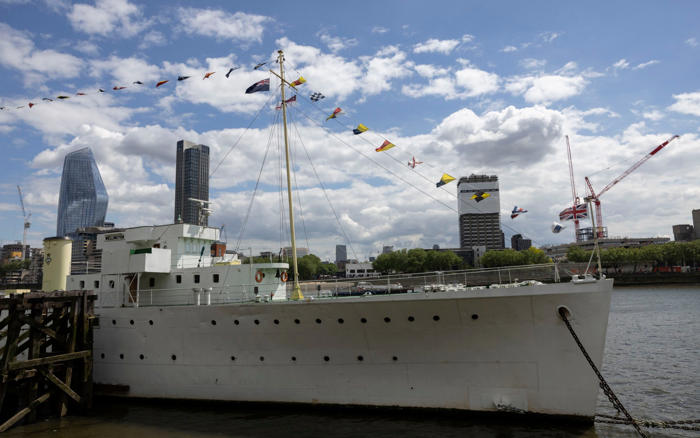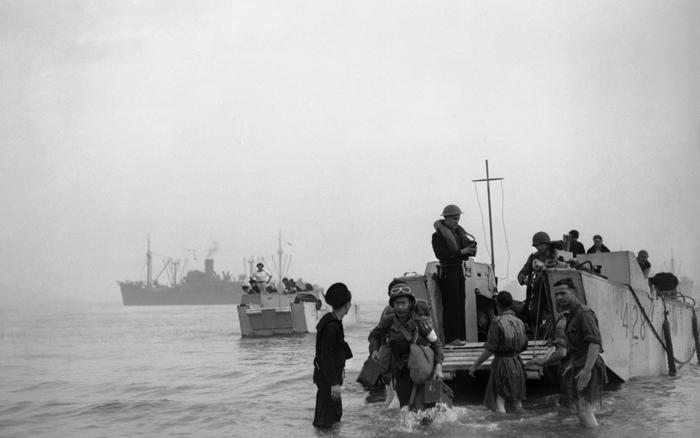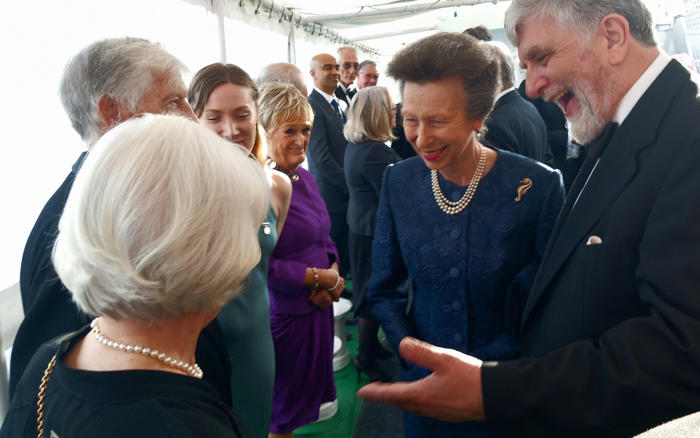Appeal to save Navy ship that evacuated troops at Dunkirk

HMS Wellington is Britain's last surviving escort ship of its era - JEFF GILBERT
From patrolling the far-flung reaches of the Empire to escorting vital merchant convoys and evacuating British forces from Dunkirk, HMS Wellington has more than a few tales to tell.
But unless the trust which runs the veteran ship can raise £150,000 for essential repairs, she faces being scrapped.
It would be an undignified and sad ending to the life of Britain’s last surviving escort ship, a veteran of the Battle of the Atlantic whose service spanned eight decades and saw her involved in some of the most significant episodes of Britain’s wartime history.
During her time on active duty, she saved the lives of dozens of sailors and passengers in her role as an escort to the country’s merchant ships.
A Grimsby-class sloop launched from Devonport in 1934, HMS Wellington spent the pre-war years patrolling the British Protectorates in the south Pacific as part of a small naval fleet.
In the words of the Wellington Trust set up to maintain her in later years, the white-painted warship – fitted with two 4.7-inch guns, one 3-inch gun and anti-submarine depth charges – was “a small but potent symbol of British authority over an Empire which was thought that the sun would never set [on]”.
During a cruise lasting around 10 weeks, the 1,200-ton Wellington could visit around 15 islands then still owing allegiance to the Crown, scattered over some several million square miles of ocean.
The late Professor Eric Grove, of Salford University, told the documentary film about HMS Wellington, The Good Shepherd: “In these far-flung reaches the only way you could get around really was by sea, and to maintain any kind of imperial presence you needed a ship looking very smart, white hull, yellow formal, that could come along with his smart crew, perhaps with some dignitary or other to make the point that these islands were part of this great global British Empire.
“Without ships like this maintaining presence, it would have been much more difficult for these islands to have been maintained, and somebody else might have thought, well, perhaps we can maintain order better.”
During these tours it was customary for the commander and his officers to entertain local dignitaries aboard Wellington, with the ship’s crew taking part with the islanders in games of cricket or football.

HMS Wellington was part of the West Africa Command of the Royal Navy - IWM/GETTY
School children from the islands were often welcomed on board for educational purposes and given the chance to experience day-to-day life on board a British warship.
The patrols came to an end on August 21, 1939, when the ship was ordered to return to Auckland “with despatch” as war clouds were gathering across Europe.
Soon she was recalled for active duty and ordered home via the Suez Canal. Having reached Aden, Wellington – which had a cruising speed of 10 knots and a maximum speed of 16 knots – was redirected to Freetown in Sierra Leone to undertake convoy duties, escorting 10 merchant ships back to the UK.
It was a vital role that she was to play almost uninterruptedly for the next five and a half years and on three occasions her crew were instrumental in saving the lives of many of the passengers and crews of merchant ships that had been torpedoed by U-boats.
“Ships like Wellington were the best escorts in many ways that the Royal Navy had, and they were crucial to winning the Battle of the Atlantic. There were many merchant ships I think that survived World War 2 because of the escort of this sloop,” said Prof Grove.
“Wellington was typical of the unspectacular way in which the escort forces of the Royal Navy carried out their function, and their primary function was the safe and timely arrival of the convoy. If you could sink U-boats well and good, fine, but the main task was to get the ships through,” added Prof Grove.
“What we tend to forget is that most convoys in the Second World War were not attacked. They were routed around known threats. The numbers of ships lost by convoys escorted by Wellington was very, very small, and that was a great success, but a success that tends to be unsung because it’s not spectacular.”
Griff Williams, who served on the Wellington, later told of the drama and fear her crew experienced on those protective voyages.
“If she was being pushed forward fast enough in bad weather, she could drop over a big wave fast enough to leave the propellers out of the water, and the wind of the turbines would rise to a scream as her screws freewheeled. Then she shuddered as if she was laughing as they bit into the sea again.”
Depth charges would occasionally be deployed to deal with the threat of the U-boats hidden beneath the surface, recalled Mr Williams.

The Princess Royal is the patron of the Wellington Trust
“To those sealed below deck each explosion sounded like a massive sledgehammer pounding on the shipside,” he said.
But even ships like HMS Wellington could not stop every U-boat getting through.
Before his death in 2020, Able Seaman Peter Gibbs, the last known surviving member of HMS Wellington’s company, recalled the sight of a merchant ship being hit: “What they must have gone through was unbelievable… just carrying on as they normally do and the next minute you hear a bang and that was it… you see the smoke go up,” he told The Good Shepherd. “Little bit of a sickening feeling seeing it, but you got so used to it then, you see.”
HMS Wellington, also saw action during the evacuation of the British Expeditionary Force from Dunkirk, when she was called off convoy duty and ordered to St Valery, 30 miles north-east of Le Havre.
Here the 51st Highlanders were virtually trapped and Wellington used her motor boat and whalers in an attempt to evacuate personnel from the beaches.
Fog prevented any rescue ships reaching the coast and the 51st Highlanders were forced to surrender and became prisoners of war.
An account of the operation published on the Wellington Trust’s website states: “That evening, all who could make their way under cover of darkness to the port and beaches to wait in vain. At 3am, the situation became even more confusing when a heavy low-lying fog descended.
“This allowed the Germans to see the top of the British ships’ masts from the cliff tops around St Valery, which they could fire on whilst inhibiting movement on the water. With the combination of the fog, the tidal problems at St Valery, and the advancing Germans, the evacuation was finally abandoned on June 12.”
Despite the setback the Wellington had managed to embark 300 soldiers at St Valery before heading back across the Channel to safety.
Panzer attack
During the operation the ship was hit in the captain’s pantry by shrapnel and is believed to be the only ship in the Royal Navy to have suffered shell damage from a Panzer tank.
In August 1943 Wellington was redeployed to the West Africa Command where she was employed as an escort to the convoys sailing between Freetown, Takoradi and Lagos. By the end of the war she had steamed nearly a quarter of a million miles, escorting over 100 convoys in the western approaches of the Atlantic and further east on the coast of Africa as well as in the Mediterranean.
With the war over Wellington was transferred to the Reserve Fleet and spent a rather undignified year on a mud berth in Milford Haven, before being sold to the Honourable Company of Master Mariners.
The company sailed HMS Wellington up River Thames in 1948 to her current berth on Victoria Embankment, just opposite Temple tube, where she has acted as an educational facility for schoolchildren ever since.
In a recent speech for the 90th anniversary of the launch of the ship, Professor Dominic Tweddle, trustee at The Wellington Trust, urged that it must be saved, saying: “Most people say it is a question of cost, but it is no more difficult to maintain, no more cost to maintain that say, York Minster. But I don’t think it is a question of cost, it is a question that in our everyday lives we walk around historic cityscapes, we go out to historic landscapes, and we value those things that are familiar to us.
“Very few of us these days are around or in ships, nor will not perhaps appreciate their importance. They are. They are our lifeline to the world. So I think it is a question of what we are familiar with and value.”
Play The Telegraph’s brilliant range of Puzzles - and feel brighter every day. Train your brain and boost your mood with PlusWord, the Mini Crossword, the fearsome Killer Sudoku and even the classic Cryptic Crossword.
